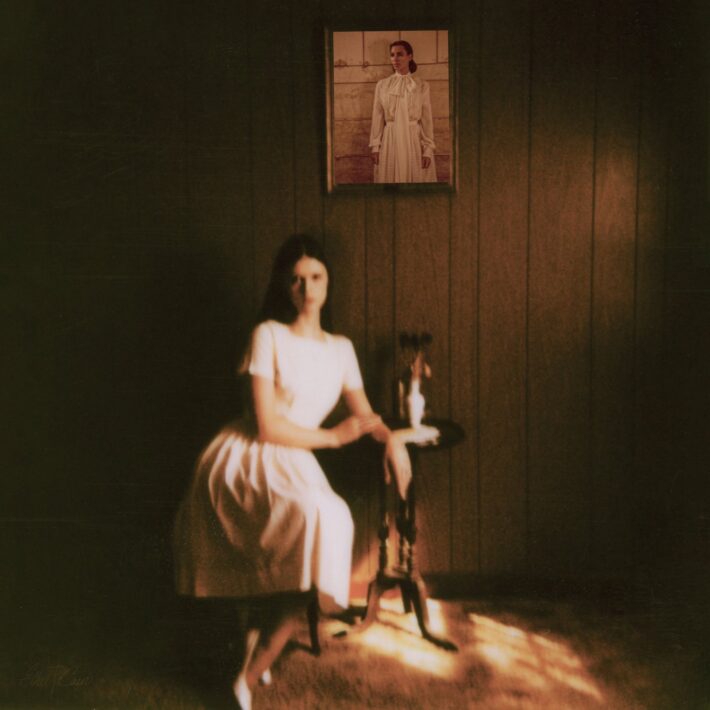
Nebraska, California, and Alabama – Three states among 50 in the United States of America. Three states that have ostensibly nothing to do with one another. Three states that aren’t even tethered by a continuous interstate. Three states that magically come together in the birth of Ethel Cain’s debut album, ‘Preacher’s Daughter’. Written in her Alabaman home, Hayden Silas Anhedönia pens down the fictional adventure of the titular preacher’s daughter, an alter-ego named Ethel Cain. Journeying from the conservative south to the “free” west – California – Anhedönia tells us a story of pain, love, and religion with the spectre of transgenerational trauma looming over every song.
This record is a concept album, which has been done many times before, with music titans such as Pink Floyd and Green Day claiming some of the most influential records to date – The Dark Side of the Moon and American Idiot respectively. Despite this increasing saturation, great expectations, and her small following, Anhedönia has still managed to produce one of the most flawless concept albums to date. Meshing her songwriting and storytelling prowess together, each song is a chapter to what feels like a 600-paged epic that is simultaneously poignant and breathtaking.
Opening with a pseudo-ambient, slowcore tune, ‘Family Tree (Intro)’ self-referentially introduces us to the world of Cain. Themes of Christianity and intergenerational trauma are striking as Cain sings about the pedigree of the violence she faces, one that is inescapable, as seen in the line “Jesus can always reject his father // But he cannot escape his mother’s blood.” Such thematic lyrics are aplenty in this album, and this song is an introduction to what’s to come in the next 1 hour and 12 minutes.
The next song, ‘American Teenager’, is a heartland rock and ambient pop banger that reveals more of Cain’s provenance – a warmongering America that claims the lives of young men who see soldiery as a ticket towards social mobility. In addition, we gain insight into who Cain is: a disillusioned devotee who no longer finds solace in her religion as a result of the cyclical abuse that she had faced. The same abuse that has cost the lives of many young soldiers, “Another red heart taken by the American dream”.
Enter Nebraska. ‘A House in Nebraska’ is a lengthy torch song dedicated to Cain’s first lover, Willoughby Tucker. She sings of dirt roads and empty bottles, sorrowfully lamenting the loss of a sacred love she shared with Tucker. To Anhedönia, Nebraska represents something beatific. A place with a “wide open expanse” where no one would the fictitious pair again. Sonically beautiful and reflecting on a beautiful romance, the song ends with the repetitive refrain “I feel so alone”. Cain is confronted with thoughts of perpetual loneliness and as listeners, we are moved to ponder the future of Cain’s love life.
Find a new lover she did. ‘Western Nights’ croons of a new and fundamentally different lover, a violent and abrasive man named Logan Phelps. With a pop-rock cadence, Cain declares her unconditional love for Phelps, even willing to “hold the gun if you [Phelps] asked me [Cain] to”. While she acknowledges the wrongs in his lifestyle, she continues to hold onto a shred of hope that “one day, you and I could be ok”, as though afraid of losing Phelps the same way she lost Tucker.
‘Family Tree’ echoes the same message as its introductory counterpart, except this time, there is a new, more macabre dimension to the song. Although still about transgenerational trauma, this latest rendition follows the aftermath of Phelps’ death after a failed bank robbery, where Cain is forced to go on the run. She recollects her hellish experiences of being taught how to murder. As the crosses on her body remind her of who she used to be, she sings anthemically of being washed clean in the river – a desperate attempt to reclaim the innocence of the person she once was.
Continuing this streak of elegiac songs, we meet ‘Hard Times’. Through a bedroom pop tune, she sings of her sexual abuse at the hands of her father and how it muddled their relationship. With him being a deacon, she admires him for the man he is outside the confines of her house – a god-fearing man and a leader of the community – but despises him for the father he was not. She sings the heart-wrenching lines “I’m tired of you still tied to me (I just wanna sleep)” in the outro, showing her helplessness in the abuse that happens routinely – marking the act of Act 1.
Act 2 opens with ‘Thoroughfare’, a whopping 9:28 minute-long country epic that juxtaposes Act 1 with its themes of optimism, including an active romance of a love born out of the thoroughfare. Driven to leave her hometown, she takes off on a hitchhiking journey to the west. Along the way, she meets a man named Isaiah, who agrees to drive her anywhere she wants. On their journey to California, they found themselves becoming attracted to each other and thereafter, Cain sings of the very motel room that they fell in love in and Isaiah’s pickup truck that felt like the world to her. The song closes with a scat jamming session that carries a sense of glee l, making it seem as if things are starting to look up for Cain.
However, almost jarringly, ‘Gibson Girl’ indicates the start of the end for Cain, as Isaiah starts pimping her out and inebriating her with drugs and alcohol. An uncomfortable entry to the album, this alt-pop tune deals with themes of grooming and gaslighting as we soon learn that the love Cain has for Isaiah is not reciprocal. As she slaves away in the strip club Isaiah pimped her to, she sings of being an unknowing victim of Isaiah’s manipulation – entranced and subjugated.
We finally come to the climax of the album. In this industrial and doom metal song, ‘Ptolemaea’ describes Cain’s experience under the influence of Isaiah’s drugs. Disconcerting at its core, the listener is flanked with ghoulish whispers, a blood-curdling scream, and a Christian sermon, all within its 6:24 minute runtime. Interestingly, the song is named after Ptolemy, a ring of hell from “Dante’s Inferno” where traitors are kept, possibly alluding to her abandonment of her family and faith, likening her experiences with Isaiah and drugs to Ptolemy. Here, she is one of the traitorous.
‘August Underground’ and ‘Televangelism’ are interludes that follow the morbid death of Cain and its aftermath. The former is a doom-ambient track that scores Cain’s captivity in the attic of an abandoned shack, where Isaiah eventually murders her. ‘Televangelism’ is an ambient track that describes Cain’s ascension to heaven. These two tracks are profoundly evocative and are exemplary in evocating the same emotions felt by Cain in the listener.
The story of one’s life ends with death, but to Anhedönia, death is simply a passage between life and the afterlife. ‘Sun Bleached Flies’ is an introspective country power ballad that follows Cain as she makes peace with her death and reflects on her time alive – in the Church, in her home, and in love. She sings of the troubles of organised religion, where dogmas of God loving you is ubiquitous, but to a select few, it still is “not enough to save you”. She ultimately absolves herself of the cycle of abuse she had faced by forgiving the people who had done her harm and refusing to perpetuate the same violence. In the end, she remembers her first love, Willoughby Tucker, and sings of the same house in Nebraska that she wishes to spend her ‘forever after’ in with Tucker.Marking the end of Ethel Cain’s story, ‘Strangers’ explores Cain and Isaiah’s relationship post-murder. Through this hair rock and grunge tune, we are treated to rich imagery of her grave: the freezer. A fitting casket for the fate that would befall her corpse as Isaiah routinely cannibalises her. She sings of being eaten, being all over his mouth and in his stomach. As if this is the peak of love and intimacy, she likens this horrid act to “making love” and casts a warm light on him with the lyrics “You’re so handsome when I’m all over your mouth”, epitomising this. As a poignant closer, she sends a final message to her mother, declaring that she has never blamed her mother for the abuse she had faced and that she loves her so.
This was but a short teaser into the world of Ethel Cain’s Preacher’s Daughter. Lyricism and themes alone are not enough to appreciate the genius of this record, and I strongly encourage you to listen to the whole album. If the intrigue of its deeply profound lore is not enough to draw you in, the aria and beautiful instrumentation are one of many aspects of this album that could.


